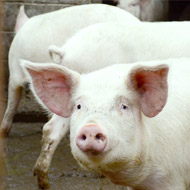New pig virus could be a threat to humans

The next step for researchers is to look for antibodies in the blood of humans, which would suggest the virus has already begun to infect people.
A recently discovered pig virus could spread to humans and other animals, a study has shown.
Porcine deltacoronavirus was first detected in pigs in China in 2012 and has since spread to various other countries. It causes acute diarrhoea and vomiting in young infected pigs and can even be fatal.
So far, no human cases have been reported but scientists are concerned about the possibility.
Public health experts are particularly concerned about the emergence of this virus, because of its similarity to the life-threatening viruses responsible for SARS (severe acute respiratory syndrome) and MERS (Middle East respiratory syndrome).
New research published online in the journal PNAS suggests that porcine coronavirus could go into the cells of different species, including humans.
Scientists from Ohio State University and Utrecht University looked at a cellular receptor called aminopeptidase N. The potential for a virus to cross species is known to be highly dependent on its ability to bind to receptors on the cells of the animal or human.
They found the virus could bind to the receptor in pigs, but also to cells from humans, cats and chickens.
It is not yet known whether the virus can replicate within the cells and cause disease in these other species. The next step for researchers is to look for antibodies in the blood of humans, which would suggest the virus has already begun to infect people.
Senior author Linda Saif said: “We now know for sure that porcine deltacoronavirus can bind to and enter cells of humans and birds. Our next step is to look at susceptibility – can sick pigs transmit their virus to chickens, or vice versa, and to humans?”



 RCVS Knowledge has called on vet practices to audit their post-operative neutering outcomes.
RCVS Knowledge has called on vet practices to audit their post-operative neutering outcomes.